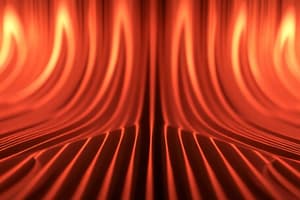Podcast
Questions and Answers
What branch of physics deals with the behavior of light as a wave?
What branch of physics deals with the behavior of light as a wave?
- Geometrical optics
- Wave optics (correct)
- Quantum optics
- Particle optics
In Young's double slit experiment, what does interference refer to?
In Young's double slit experiment, what does interference refer to?
- The refraction of light through the slits
- The bending of light waves
- The absorption of light by the screen
- The interaction of two or more waves (correct)
What characteristic of a wave is exhibited in Young's double slit experiment?
What characteristic of a wave is exhibited in Young's double slit experiment?
- Refraction
- Interference (correct)
- Diffraction
- Reflection
When waves add together in phase in Young's experiment, what type of interference occurs?
When waves add together in phase in Young's experiment, what type of interference occurs?
What did Thomas Young's double slit experiment reveal about light?
What did Thomas Young's double slit experiment reveal about light?
What creates bright bands on the screen in Young's double slit experiment?
What creates bright bands on the screen in Young's double slit experiment?
What is the characteristic pattern formed on the screen in Young's double-slit experiment?
What is the characteristic pattern formed on the screen in Young's double-slit experiment?
What is the fringe width in Young's double-slit experiment inversely proportional to?
What is the fringe width in Young's double-slit experiment inversely proportional to?
In Young's double-slit experiment, what principle does diffraction demonstrate?
In Young's double-slit experiment, what principle does diffraction demonstrate?
Which factors are included in the double-slit equation to calculate the intensity of light at a particular angle?
Which factors are included in the double-slit equation to calculate the intensity of light at a particular angle?
What does the double-slit experiment reveal in quantum mechanics according to the text?
What does the double-slit experiment reveal in quantum mechanics according to the text?
How does the interaction with the double slit introduce the concept of superposition in Young's double-slit experiment?
How does the interaction with the double slit introduce the concept of superposition in Young's double-slit experiment?
Study Notes
Exploring Wave Optics through Young's Double Slit Experiment
Wave optics is a branch of physics that deals with the behavior of light as a wave. It's a conceptual shift from the geometrical optics view where light is considered a stream of particles called photons. In this realm, we'll examine the fundamentals of wave optics through one of its most famous experiments: Young's double slit experiment.
The Experiment
In 1803, Thomas Young demonstrated how light behaves as a wave by passing it through two closely spaced, parallel slits. The resulting interference pattern revealed fascinating characteristics of wave optics that could not be explained by geometrical optics.
In the experiment, light passes through two closely-spaced slits and illuminates a screen. The light waves emanating from each slit exhibit a property called interference, where the combining of waves either strengthens or weakens the final result.
Interference
Interference is a phenomenon where two or more waves interact, resulting in an altered waveform. In Young's experiment, when the waves from the two slits meet, they can either constructively or destructively interfere.
Constructive interference occurs when the waves add together in phase, resulting in an enhanced intensity at certain angles. This causes the light to form bright bands on the screen.
Destructive interference happens when the waves' phase differences cause them to cancel out, resulting in a diminished intensity at certain angles. This produces dark bands on the screen.
The Interference Pattern
The intensity of the light on the screen at each angle forms a characteristic interference pattern. The pattern consists of bright and dark bands that form an alternating series of light and dark fringes. The distance between these fringes, called the fringe width, is inversely proportional to the wavelength of the light.
Diffraction
Young's experiment also demonstrates the principle of diffraction, where light bends around objects in its path. When light passes through the slits, it fans out at the edges, causing the intensity of the light to decrease at the edges of the central maximum.
The Double-Slit Equation
The mathematical description of the interference pattern is given by the double-slit equation. The equation is used to calculate the intensity of light at a particular angle on the screen by considering the path differences between the light waves emanating from the two slits. The equation includes factors such as the slit width, separation between the slits, and the wavelength of the light.
Quantum Mechanical Interpretation
Beyond the classical wave optics interpretation of Young's experiment, it has also found relevance in quantum mechanics. According to quantum mechanics, the double-slit experiment demonstrates the wave-particle duality of light as well as the concept of wave function collapse.
In this interpretation, the light passing through the slits exhibits both wave and particle behavior, and its interaction with the double slit introduces the concept of superposition, where photons exist in multiple states until they are measured.
As we've seen, Young's double slit experiment is a classic illustration of the fascinating world of wave optics. Interference, diffraction, and wave function collapse are just a few of the many phenomena it reveals. As you continue to explore wave optics, let Young's experiment serve as a gateway to understanding how light behaves as a wave.
Studying That Suits You
Use AI to generate personalized quizzes and flashcards to suit your learning preferences.
Description
Delve into the realm of wave optics through Young's double slit experiment, a classic demonstration of light's wave behavior. Explore concepts like interference, diffraction, and quantum mechanical interpretations related to this fundamental experiment.



